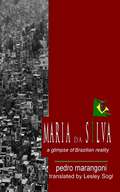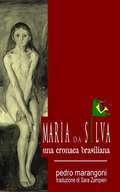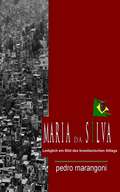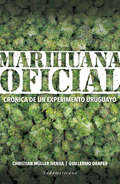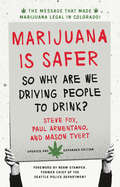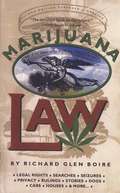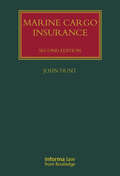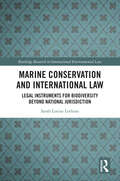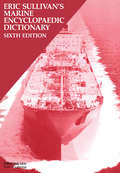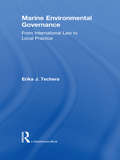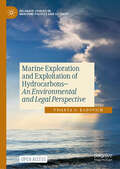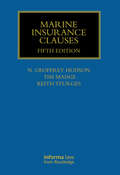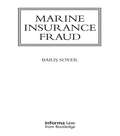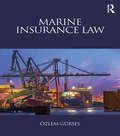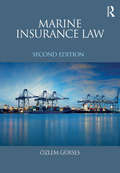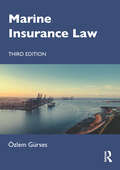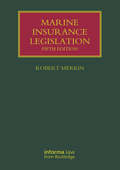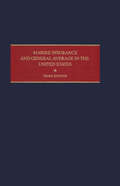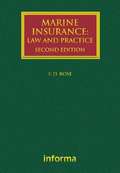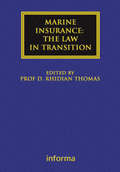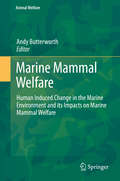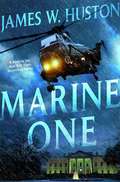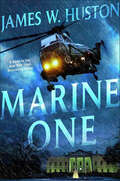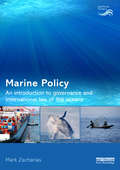- Table View
- List View
Maria da Silva - A glimpse of Brazilian reality
by Pedro Marangoni Lesley SoglA glimpse of Brazil's harsher side. This is a story about a young girl's daily struggle to survive among the damned and forgotten of a favela. Her search to find a friend and a place of hope in a dark, cruel and pitiless world.
Maria da Silva - Una cronaca brasiliana
by Sara Zampieri Pedro MarangoniNon si può affermare che Maria da Silva sia un lavoro di finzione, perché è una cronaca del quotidiano senza ritocchi. Un piccolo libro sulla vita breve di una rivenditrice di spazzatura. Qui non ci sono descrizioni superflue, così l'immaginazione del lettore, mentre legge il romanzo, comporrà l'ambiente con lo scenario che conosce, che si svolge vicino a lui, che visualizza giorno per giorno e le cui dinamiche gli sono ignote. Le "Maria da Silva" muoiono quotidianamente di inedia e di malattie non curate, in un breve e tragico cammino di vita, portando con sé un'intera storia ignorata dai più. È ora di vederle come esseri umani, e questo piccolo libro può aiutare. Sento che l'opera non è mia, io sono solo un tramite del messaggio di Maria da Silva. Credo che se qualche lettore cambierà dopo averla conosciuta, che sia solo nello sguardo che lancia ai senzatetto che rivendono spazzatura -che estraggono quello che viene disprezzato, senza elemosinarlo- la missione che mi è stata assegnata dal caso sarà compiuta.
Maria da Silva: Lediglich ein Bild des brasilianischen Alltags
by Pedro MarangoniMan kann "Maria da Silva" nicht als Science-Fiction bezeichnen, weil es ein Porträt des Alltags ist, ohne zu beschönigen. Ein kleines Buch über die kurze Lebensdauer einer Müllsammlerin. Hier gibt es keine überflüssigen Beschreibungen, so dass die Phantasie des Lesers die Umgebung zusammenfügen muss, indem er das Drama im Rahmen der Szene liest, die er kennt, die sich in seiner Nähe abspielt, die er im Alltag visualisiert und deren Herz er nicht kennt. "Marias da Silva" sterben täglich an Hunger und unbehandelten Krankheiten in einer kurzen und tragischen Reise des Lebens, und bergen darin eine ganze Geschichte, die von anderen Mitbürgern ignoriert wird. Es ist an der Zeit, sie als menschliche Wesen zu sehen, und dieses kleine Buch kann dabei helfen. Ich habe das Gefühl, dass das Werk nicht mir gehört, ich bin nur der Moderator der Botschaft von Maria da Silva. Ich glaube, wenn sich einige Leser ändern, nachdem sie dies kennengelernt haben, und sei es nur, dass sich der Ausdruck ihres Blickes auf die Müllsammler ändert - die das Verabscheute sammeln und nicht betteln - wird die mir zufällig anvertraute Mission erfüllt sein ...
Marihuana oficial: Crónica de un experimento uruguayo
by Christian Muller Guillermo DraperLa historia de un experimento que quedará para la historia, tanto si tiene éxito como si fracasa. Desde que José Mujica recorrió cuarteles para ver dónde podía plantar marihuana hasta que el cannabis echó raíces en un predio estatal pasaron más de tres años y una elección. La venta de la droga en farmacias completa un sistema único que rompe con décadas de prohibición y le disputa al narcotráfico uno de sus mercados.Una investigación periodística con más de cuarenta entrevistados, Marihuana oficial cuenta qué llevó al gobierno de Uruguay a embarcar a un pequeño país en un viaje desconocido. En sus páginas hay narcos, policías, activistas, políticos, empresarios y exguerrilleros; los protagonistas de un experimento que quedará en la historia si tiene éxito y también si fracasa.Desde que José Mujica recorrió cuarteles para ver dónde podía plantar marihuana hasta que el cannabis echó raíces en un predio estatal pasaron más de tres años y una elección. La venta de la droga en farmacias completa un sistema único que rompe con décadas de prohibición y le disputa al narcotráfico uno de sus mercados.Una investigación periodística con más de cuarenta entrevistados, Marihuana oficial cuenta qué llevó al gobierno de Uruguay a embarcar a un pequeño país en un viaje desconocido. En sus páginas hay narcos, policías, activistas, políticos, empresarios y exguerrilleros; los protagonistas de un experimento que quedará en la historia si tiene éxito y también si fracasa.
Marijuana Is Safer
by Steve Fox Paul Armentano Mason TvertNationally recognized marijuana-policy experts Steve Fox, Paul Armentano, and Mason Tvert compare and contrast the relative harms and legal status of the two most popular recreational substances in the world--marijuana and alcohol. Through an objective examination of the two drugs and the laws and social practices that steer people toward alcohol, the authors pose a simple yet rarely considered question: Why do we punish adults who make the rational, safer choice to use marijuana instead of alcohol?Marijuana Is Saferreaches for a broad audience. For those unfamiliar with marijuana, it provides an introduction to the cannabis plant and its effects on the user, and debunks some of the government's most frequently cited marijuana myths. For current and aspiring advocates of marijuana-law reform, as well as anyone else who is interested in what is becoming a major political battle, the authors spell out why the message that marijuana is safer than alcohol must be a prominent part of the public debate over legalization. Most importantly, for the millions of Americans who want to advance the cause of marijuana-policy reform--or simply want to defend their own personal, safer choice--this book provides the talking points and detailed information needed to make persuasive arguments to friends, family, coworkers, and elected officials.
Marijuana Law
by BoireOver a million people in the United States regularly smoke marijuana. Approximately 400,000 defendants each year are charged with the use, possession, sale, or cultivation of marijuana. MARIJUANA LAW describes how people can reduce the probability of arrest and defend themselves from prosecution if arrested.Readers will learn when a police officer can legally stop them; when they can be searched; when they have to be read their rights; what to do if an officer comes to their home with (or without) a search warrant; and how to counter many police tactics simply by knowing their rights.Contains information on the necessity defense in medical marijuana cases, drug testing, case law, and federal sentencing guidelines. It also contains practical tips on individual rights and avoiding surveillance. Includes appendices on the Bill of Rights, wallet cards, atate-by-state punishment for marijuana crimes, and the13 federal circuits; plus a thorough Index.
Marijuana: A Short History
by John HudakFrom Reefer Madness to legal purchase at the corner store.With long-time legal and social barriers to marijuana falling across much of the United States, the time has come for an accessible and informative look at attitudes toward the dried byproduct of Cannabis sativa. Marijuana: A Short History profiles the politics and policies concerning the five-leaf plant in the United States and around the world.Millions of Americans have used marijuana at some point in their lives, yet it remains a substance shrouded by myth, misinformation, and mystery. This book offers an up-to-date, cutting-edge look at how a plant with a tumultuous history has emerged from the shadows of counterculture and illegality. Today, marijuana has become a remarkable social, economic, and even political force, with a surprising range of advocates and opponents. Public policy toward marijuana, especially in the United States, is changing rapidly. Marijuana: A Short History provides a brief yet compelling narrative that discusses the social and cultural history of marijuana but also tells us how a once-vilified plant has been transformed into a serious, even mainstream, public policy issue. Focusing on politics, the media, government, and education, the book describes why public policy has changed, and what that change might mean for marijuana's future place in society.
Marine Cargo Insurance, Second Edition: Marine Cargo Insurance (Lloyd's Shipping Law Library)
by John DuntThe new edition of this British Insurance Law Association (BILA)-award winning text is the definitive reference source for marine cargo insurance law. Written by a member of the Lloyd's Market Association Steering Group, the work expertly examines marine cargo insurance by reference to important English and foreign legal cases as well as the Marine Insurance Act 1906. Logically arranged to reflect the structure of the Institute Cargo Clauses, the most widely used standard form of cover, this text offers easy to find solutions for today's busy practitioner. New to this edition: Completely revised to include the Insurance Act 2015 (duty of fair presentation; warranties, fraudulent claims) Brand new chapter on the revised Institute Ancillary and Trade Clauses, including those to be introduced on 1 November 2015 Increased coverage of jurisdiction and choice of law, particularly taking into account the Rome I Regulation Enhanced coverage of the issue of Constructive Total Loss Consideration of the Law Reform Commission's proposals for the reform of insurance law, and further amendments to the Marine Insurance Act 1906. Covers latest developments in the Enterprise Bill for damages for late payment of claims Fully updated with all of the influential cases since 2009, including: The Cendor MOPU, one of the most important marine insurance cases of the last 50 years. Clothing Management v Beazley Solutions Notable hull cases such as Versloot Dredging v HDI Gerling on fraudulent devices Influential foreign cases taken from this book's sister text, International Cargo Insurance This unique text is a one-stop resource for marine insurance lawyers handling cargo claims, and will also be of interest to students and researchers of maritime law.
Marine Conservation and International Law: Legal Instruments for Biodiversity Beyond National Jurisdiction (Routledge Research in International Environmental Law)
by Sarah Louise LothianThis book provides a blueprint for an International Legally Binding Instrument (ILBI) for the conservation and sustainable use of marine biodiversity beyond national jurisdiction (BBNJ). The development of an ILBI could signify a pivotal turning point in the law of the sea by addressing regulatory, governance and institutional gaps and deficiencies in the existing international law framework for BBNJ. This book analyses the essential components an ILBI will require to effectively conserve and sustainably use BBNJ, focusing on marine genetic resources, areabased management tools, environmental impact assessments, capacity-building and marine technology transfer. It investigates potential areas of compromise, as the success of an ILBI will rely upon the support of a powerful bloc of maritime States, principally the United States, the United Kingdom, Russia, the Netherlands, France and Japan. The participation of major maritime powers will be critical as it is their nationals, corporations and flag vessels that have the financial and technical wherewithal to undertake activities beyond national jurisdiction. This bloc of States has historically been the strongest proponent of the Grotian doctrine of ‘freedom of the seas’ as it aligns with their predominant interest to preserve navigational freedom for their merchant and military fleets. Accordingly, this book assesses the extent to which the Grotian doctrine continues to exert influence on the development of the law of the sea and the development of an ILBI. Providing a comprehensive overview of this important development in international law, this book will be of interest to students, lecturers and academics of law of the sea, international environmental law and biodiversity law.
Marine Encyclopaedic Dictionary
by Eric SullivanFeaturing over 20,000 definitions, this dictionary has been revised to reflect changes and advances in the marine industry. It covers every aspect of the business, including shipbroking, chartering, marine insurance, ship's agency, freight forwarding, oil and gas, and air transport.
Marine Environmental Governance: From International Law to Local Practice
by Erika TecheraMarine Environmental Governance: From International Law to Local Practice considers the relationship between international environmental law and community-based management of marine areas. Focusing on small island states, in which indigenous populations have to a large extent continued to maintain traditional lifestyles, this book takes up the question of how indigenous customary law and state-based legislation can be reconciled in the implementation of international environmental law. Including a range of case studies, as well as detailed comparative analysis, it pursues an interdisciplinary approach to legal pluralism 'in practice' that will be of considerable interest to environmental lawyers, legal anthropologists, conservation biologists and those working in the area of community-based conservation.
Marine Exploration and Exploitation of Hydrocarbons: An Environmental and Legal Perspective (Palgrave Studies in Maritime Politics and Security)
by Violeta S. RadovichThe book analyzes the environmental regulation of upstream marine exploration and exploitation of hydrocarbons, at the international, regional MERCOSUR and Argentine national level. It uses the concept of normative integration as a methodological approach, critically assessing the interaction between the law of the sea, maritime law, environmental law and human rights law in the field of study. The book analyses the legal framework in a timeline, giving context to the evolution of the different branches of international law with sparkles of history. In this sense, the book also analyses international conventions’ bills on the subject that have not entered into force. The manuscript focuses on the reports from two marine pollution events (Deepwater Horizon and Montara oil spills) to analyse the lessons learnt and the normative and institutional framework needed to ensure environmental safety in the marine exploration and exploitation of hydrocarbons. The book critically analyses marine platform accidents’ official reports comprehensively in order to assess existing normative and institutional frameworks and to give a way forward regarding policies. The manuscript contributes to rethinking the governance of the ocean at the time of environmental challenges. In that context, it refers to the concept of normative integration and effectiveness. It takes the existing scholarship further by introducing the notion of “marine platforms” instead of “offshore platforms” to rethink the relationship between land and sea and to develop a functional approach to enhance existing regulations. This is an open access book.
Marine Insurance Clauses (Maritime and Transport Law Library)
by Tim Madge Geoffrey N Hudson Keith SturgesThe new edition of Marine Insurance Clauses reflects numerous changes and additions to the policy clauses, and particularly the new style of the organisation entitled the International Underwriting Association of London in 2002. The new edition will bring you up to date with the present complex and sometimes confusing variations in policy conditions. Part of the Maritime and Transport Law Library.
Marine Insurance Fraud (Maritime and Transport Law Library)
by Baris SoyerThis book provides a comprehensive and coherent legal analysis of the impact of fraud on the position of various parties to a marine insurance contract, as well as the cover provided by standard marine policies. The issues under discussion in this invaluable guide are also equally relevant in the context of non-marine insurance contracts. Helpfully divided into two parts; the first part deals with the impact of fraud committed by parties to an insurance contract i.e. the assured, brokers and insurers.The second part analyses the extent to which standard marine policies cover the fraudulent and dishonest activity of third parties to an insurance contract. This book will be of huge practical assistant to practitioners specialising in marine insurance as well as insurance generally, and to professionals, academics and post-graduate students.
Marine Insurance Law
by Ozlem GursesThis book expertly introduces and clearly explains all topics covered in marine insurance law courses at undergraduate and postgraduate levels, offering students and those new to the area a comprehensive and accessible overview of this important topic in commercial law. Beginning by introducing the general principles of the subject, the structure and formation of insurance contracts, Marine Insurance Law then looks to individual considerations in detail, including: brokers, losses, risks and perils, sue and labour, reinsurance, and mutual insurance/P&I clubs. This title has been developed with the needs of courses specifically in mind, and its content has been tailored to include the most important and commonly taught topics in the field. Each chapter contains end of chapter further reading to support student research, ensuring this new textbook provides a reliable and accessible gateway into this important topic in maritime law
Marine Insurance Law
by Ozlem GursesMarine Insurance Law, Second Edition introduces and clearly explains all topics covered in courses at Masters level, offering students and those new to the area a comprehensive and accessible overview and way into this important topic in maritime law. Beginning by introducing the general principles of the subject and structure and formation of insurance contracts, this text goes on to look at individual considerations in detail, including – the duty of utmost good faith /fair presentation of the risk, insurable interest, terms of insurance contracts, brokers, the premium, causation and marine perils, losses, sue and labour, subrogation, fraudulent claims and reinsurance. This second edition reflects the substantial changes introduced by the Insurance Act 2015, and includes new Appendices containing relevant legislation and example clauses from marine insurance contracts.
Marine Insurance Law
by Özlem GürsesMarine Insurance Law introduces and clearly explains all topics covered in undergraduate and postgraduate-level courses, offering students and those new to the area a comprehensive and accessible overview of this important topic in maritime law. Observing the general principles of the subject and structure and formation of insurance contracts, this text goes on to look at individual considerations in detail, including the duty of utmost good faith/fair presentation of the risk, insurable interest, terms of insurance contracts, warranties and conditions, brokers, the premium, causation and marine perils, losses, sue and labour, subrogation, fraudulent claims, and reinsurance. The third edition has been fully updated and expanded to cover additional pre-Marine Insurance Act 1906 (MIA 1906) cases, as well as the implications of the Insurance Act 2015 on the duty of fair presentation of the risk in business insurance and on the remedy for breach of a warranty. The reader will also read about the emphasis placed by the UK Supreme Court on the construction of s. 55 of the MIA 1906, and the challenges faced in respect of claims for a constructive total loss of the subject matter insured, which are especially current at the time the book is being prepared for its publication. This textbook is the ideal companion for any student, academic, and practitioner wishing to study the subject and to explore more detailed information on the principles of marine insurance law.
Marine Insurance Legislation (Lloyd's Shipping Law Library)
by Robert Merkin Aysegul Bugra Johanna Hjalmarsson Jennifer LavelleProviding thorough, up-to-date coverage of the operation of marine insurance legislation, this text is an essential resource for today's marine insurance professional. Designed with the reader in mind, previous editions of this book have been heavily praised for its accessible and highly-practical format. Section by section, the authors deliver expert commentary on the Marine Insurance Act 1906 and related marine insurance legislation. The origin of each section or provision is clearly explained, along with the authorities decided since the legislation came into force. New to this edition: Heavily revised with the very latest case law since 2010, some of which having a dramatic effect on the law of marine insurance. The most important cases include The Cendor Mopu and Masefield v Amlin. All relevant new cases have been added from across the common law world Clarification on new legislation such as the Third Parties (Rights against Insurers) Act 2010 and the Consumer Insurance (Disclosure and Representations) Act 2012 The compulsory insurance provisions affecting oil pollution and passengers The rules on jurisdiction and choice of law in the Brussels Regulation and the Rome I Regulation This compressive text is indispensable for marine lawyers, industry professionals, and students of marine insurance law worldwide.
Marine Insurance and General Average in the United States: An Average Adjusters Viewpoint
by Leslie J. BuglassThis third edition, like the previous editions, addresses a difficult subject in language understandable to both laymen and professionals. The book deals with the principles of marine insurance applicable to both ship and cargo interests, from the start of negotiations with insurers to the signing of the policy. Thereafter, it takes the reader through the various losses that are recoverable. Such volatile subjects as mortgagee's interest insurance and punitive damages are also dealt with.
Marine Insurance: Law and Practice (Lloyd's Shipping Law Library)
by Francis RoseMarine Insurance: Law and Practice, Second Edition, continues to provide the most comprehensive and integrated account of the English law and practice of marine insurance. It provides readers with a fresh and up-to-date review of the modern law in the light of traditional principles and rules of underlying commercial law, and the specific statutory rules of marine insurance as interpreted by case law, as moderated in practice by market practices and standard form marine insurance clauses. Francis Rose clarifies the law’s underlying framework of principles and illustrates how it works in common contractual situations, explaining how the different components of the law interact. The new edition has been updated to incorporate: • the most recent case law: there have been some very important judgments handed down since the book first published, including: The Cendor MOP, The Silva, The Resolute and The Marina Iris• the implications of the introduction of: Institute Cargo Clauses 2009, the effect of the Gambling Act 2005 and the Third Parties (Rights Against Insurers) Act 2010 Law Commission reform proposals The book explores in detail the following areas: • the nature of insurance• insurable interest• the insurance contract• the premium• insured risks• marine risks• exclusions• losses• claims• subrogation• double insurance
Marine Insurance: The Law in Transition
by PROFESSOR D. RHIDIAN THOMASThe book examines and analyses in depth the specific issues which are currently occupying the marine insurance markets and the law. The London market is currently re-examining its practices and international competitiveness; and the English case law is growing significantly. The issues identified in the book are the “fundamental issues” on which marine insurance law is based, and which are in the process of being re-examined and developed further to respond to the needs of modern insurance practice. They are of wider interest to insurance law in general and the evolution of English law is analysed against the backdrop of legal developments in Europe and Scandinavia.
Marine Mammal Welfare
by Andy ButterworthMarine mammals attract human interest – sometimes this interest is benign or positive – whale watching, conservation programmes for whales, seals, otters, and efforts to clear beaches of marine debris are seen as proactive steps to support these animals. However, there are many forces operating to affect adversely the lives of whales, seals, manatees, otters and polar bears – and this book explores how the welfare of marine mammals has been affected and how they have adapted, moved, responded and sometimes suffered as a result of the changing marine and human world around them. Marine mammal welfare addresses the welfare effects of marine debris, of human traffic in the oceans, of noise, of hunting, of whale watching and tourism, and of some of the less obvious impacts on marine mammals – on their social structures, on their behaviours and migration, and also of the effects on captivity for animals kept in zoos and aquaria. There is much to think and talk about – how marine mammals respond in a world dramatically influenced by man, how are their social structures affected and how is their welfare impacted?
Marine One
by James W. Huston"Marine One" expertly mixes political intrigue with courtroom drama and fast-paced action in one of the most exciting thrillers of the year.
Marine One
by James W. HustonAn attorney and Marine veteran must unravel a deadly conspiracy in this explosive legal thriller by a New York Times–bestselling author.The President rushes across the South Lawn through a pounding thunderstorm to board Marine One and fly to Camp David late at night. Advisors plead with him not to go—but he insists. He has arranged a meeting that only three people in his administration know about. But he never gets there. Marine One crashes into a ravine, killing all aboard . . .The government accuses the French helicopter manufacturer of killing the president. Senate Investigations and Justice Department accusations multiply as Mike Nolan, a trial attorney and a Marine Corps reserve helicopter pilot, is hired to defend the company against a wrongful death lawsuit brought by the First Lady.Now Nolan must find out what really caused Marine One to crash, and why the president threw caution aside to attend a secret meeting. To clear his client, Nolan must win the highest-profile trial of the last hundred years with very little working for him and many working against him—intent on stopping him at any cost . . .Praise for Marine One“Bestseller Huston . . . grabs the reader by the lapels with the opening sentence of the first chapter of this outstanding thriller. . . . This is nonstop legal suspense at its best.” —Publishers Weekly (starred review)“This gripping thriller opens with a bang. . . . The author smoothly combines the political-conspiracy and courtroom-drama formats, and he nicely explores the story’s fundamental moral quandary. . . . The book has echoes of Michael Crichton’s Airframe.” —Booklist
Marine Policy: An Introduction to Governance and International Law of the Oceans
by Mark ZachariasThis textbook provides the reader with a foundation in policy development and analysis and describes how policy, including legal mechanisms, is applied to marine environments around the world. It offers a systematic treatment of all aspects of marine policy, including environmental protection, fisheries, transportation, energy, mining and climate change. It starts with a biophysical overview of the structure and function of the marine environment with a particular emphasis on the challenges and opportunities of managing the marine environment. An overview of the creation and function of international law is then provided with a focus on international marine law. It explores the geographic and jurisdictional dimensions of marine policy, as well the current and anticipated challenges facing marine systems, including climate change-related impacts and resource over-exploitation. The book should appeal to senior undergraduate and graduate students and form a core part of the curriculum for marine affairs, science and policy courses. It will also provide supplementary reading for students taking a course in the law of the oceans, but is not aimed at legal specialists.
